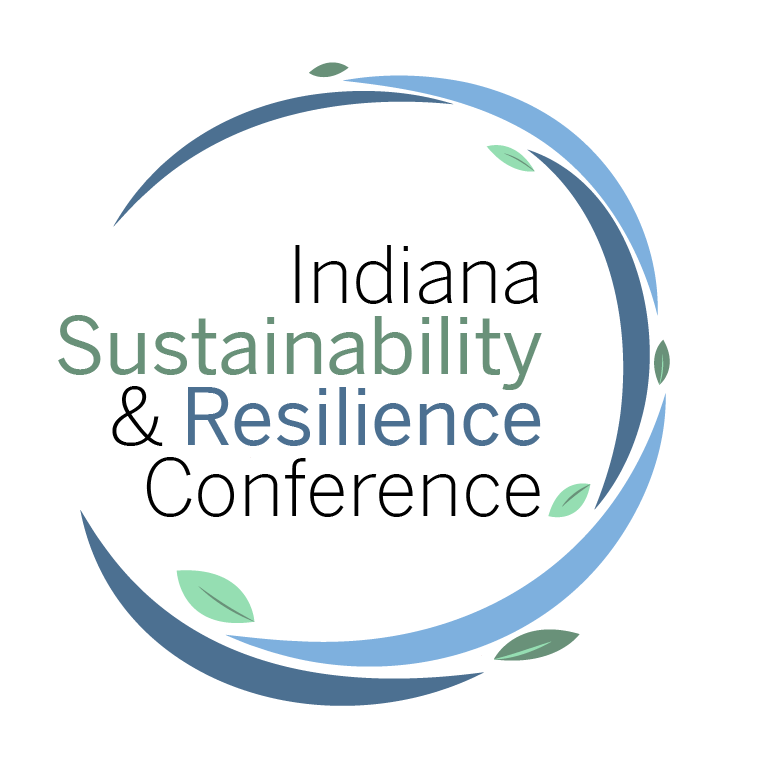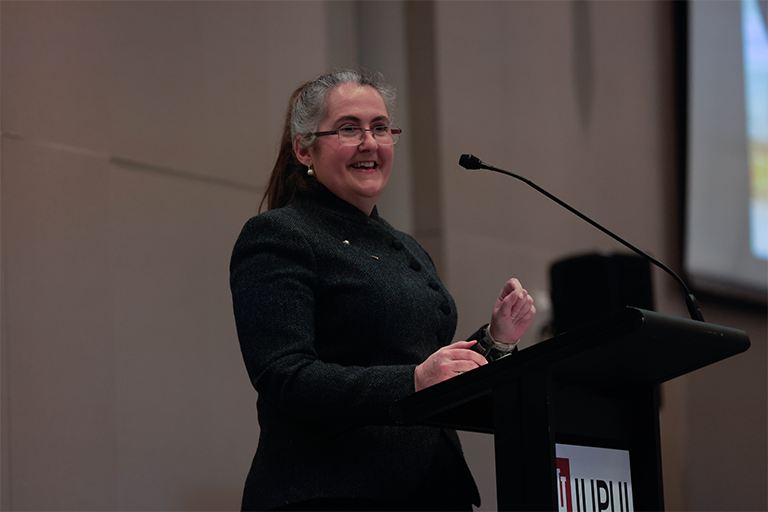While addressing an audience of more than 360 Hoosiers at the IUPUI Campus Center on Feb. 9, author and nonprofit leader Michelle Moore turned to Indiana history to illustrate the power of public utilities in American life.
In her keynote talk at the Indiana Sustainability and Resilience Conference, Moore shared an eyewitness account of a spring evening in 1880 when the city of Wabash, Ind. became the first in the country to be wholly lit by electric light.
“A group of local farmers got together, and they hitched a threshing machine engine to the west wall of the Wabash courthouse,” Moore said. “They turned the lights on by powering the generator in the basement and made a decision to create their own public power municipal utility instead of accepting a franchise from the big private utility.
“Public power was born in Indiana. The electrification of America came from people just like you and me. How can we bring that same power and that same spirit back to the work that we do today?”
Hosted by Indiana University’s Environmental Resilience Institute (ERI), the conference brought together students, academics, industry and government leaders, community groups, and others for a day of networking and knowledge sharing to advance Indiana’s sustainability and resilience.
[Photos: Indiana sustainability leaders gather to share climate solutions]
As communities contend with the environmental challenges wrought by 150 years of burning fossil fuels for electricity, transportation, and industrial use, Moore told the audience that public power utilities and rural electric cooperatives have the chance to positively impact American life once more by expanding access to renewable energy and connecting rural communities to the green economy.
A former sustainability leader in the Obama administration and the CEO of community energy nonprofit Groundswell, Moore has ample experience in harnessing institutions to improve the lives of everyday people. Many of these experiences are captured in her book, Rural Renaissance: Revitalizing America’s Hometowns Through Clean Power, in which she shares stories about the energy burdens her family and neighbors faced in her hometown of LaGrange, Ga., and lays out her vision for a thriving rural America powered by local clean energy.
Realizing that vision, however, starts with revisiting the values of institutions founded to serve the public, Moore said. This is especially critical for public power utilities and rural electric cooperatives, which hold a combined geographic footprint that spans most of the country and includes more than 90% of the poorest counties.
“Ultimately, systems produce outcomes according to the values they're grounded in,” Moore said. “We really have to think about our values very differently if we want to transform our energy systems.”
The time to make those decisions is now, Moore said. Thanks to historic levels of funding for renewable energy and sustainability projects being made available by the Biden administration—including $10 billion to upgrade rural power systems—communities of all sizes have the opportunity to rethink how local energy systems impact the local environment and their neighbors.
In Indiana, ERI and the IU Center for Rural Engagement are partnering with Hoosier communities through the Indiana Resilience Funding Hub to secure funding for projects spanning renewable energy, energy efficiency, electrification, and more.
“When you put people at the center of your local clean energy future, you can really change people's lives,” Moore said.
The Indiana Sustainability and Resilience Conference is made possible through philanthropy, including its presenting supporter, the Indianapolis Airport Authority, platinum supporter, the McKinney Family Foundation, and gold supporter, Cummins, Inc., among others.
About the Environmental Resilience Institute
Indiana University's Environmental Resilience Institute brings together a broad coalition of government, business, nonprofit, and community leaders to help Indiana and the Midwest better prepare for the challenges of environmental change. By integrating research, education, and community, ERI is working to create a more sustainable, equitable, and prosperous future. Learn more at eri.iu.edu.




